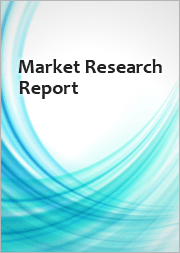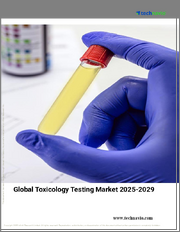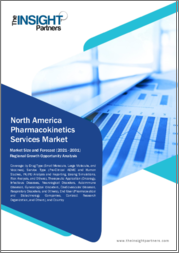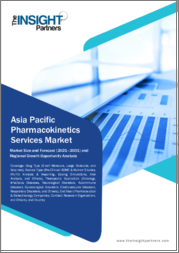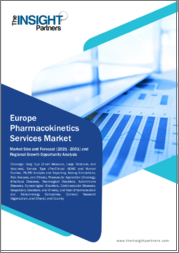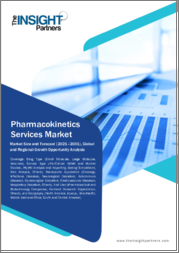
|
시장보고서
상품코드
1589012
약동학 서비스 시장Pharmacokinetics Services |
||||||
약동학 서비스 세계 시장, 2030년까지 16억 달러에 달할 것으로 전망
2023년에 10억 달러로 추정되는 약동학 서비스 세계 시장은 2023-2030년 동안 연평균 6.5%의 CAGR로 성장하여 2030년에는 16억 달러에 달할 것으로 예상됩니다. 이 보고서에서 분석한 부문 중 하나인 저분자 부문은 CAGR 6.1%를 기록하여 분석 기간이 끝날 때까지 12억 달러에 도달할 것으로 예상됩니다. 대형 분자 부문의 성장률은 분석 기간 동안 CAGR 7.9%로 추정됩니다.
미국 시장 2억 7,190만 달러로 추정, 중국은 CAGR 6.1%로 성장할 것으로 예상
미국 약동학 서비스 시장은 2023년 2억 7,190만 달러로 추정됩니다. 세계 2위의 경제 대국인 중국은 2023-2030년 분석 기간 동안 6.1%의 CAGR로 2030년까지 2억 4,920만 달러의 시장 규모에 도달할 것으로 예상됩니다. 다른 주목할 만한 지역 시장으로는 일본과 캐나다가 있으며, 분석 기간 동안 각각 5.8%와 5.4%의 CAGR을 기록할 것으로 예상됩니다. 유럽에서는 독일이 연평균 5.0%의 성장률을 보일 것으로 예상됩니다.
세계 약동학 서비스 시장 - 주요 동향 및 촉진요인 정리
약동학 서비스가 의약품 개발에 필수적인 이유는 무엇인가?
약동학 서비스는 의약품 개발 과정의 기본 요소로, 약물이 체내에서 어떻게 이동하는지, 즉 흡수, 분포, 대사 및 배설(ADME)을 이해하는 데 중요한 역할을 합니다. 이러한 서비스는 약물의 거동에 대한 인사이트를 제공하여 연구자들이 치료 효과를 위한 최적의 용량, 투여 빈도 및 전달 방법을 결정하는 데 도움을 줍니다. 약동학 시험에서 얻은 데이터는 신약이 임상시험을 거쳐 시장에 출시되기 전에 그 안전성과 유효성을 보장하는 데 매우 중요합니다. 약동학 서비스는 상세한 분석을 통해 약물이 체내에서 활성을 유지하는 시간, 간에서 분해되는 방식, 배설되는 효율을 평가합니다.
경쟁이 치열한 제약 산업에서 경쟁은 개발 주기 초기에 잠재적인 문제를 파악하여 후발 의약품이 실패할 위험을 줄일 수 있습니다. 이러한 서비스는 독성이나 효과가 없는 치료를 피하기 위해 정확한 투여가 필수적인 좁은 치료 범위의 의약품에 특히 중요합니다. 약동학 서비스는 약물이 체내를 통과하는 상세한 지도를 제공함으로써 임상시험 설계에 있어 더 많은 정보에 입각한 의사결정을 내릴 수 있게 하고, 궁극적으로 규제 당국의 승인을 받을 확률을 높입니다.
기술의 발전은 약동학 서비스 시장을 어떻게 형성하고 있는가?
최첨단 기술의 통합은 약동학 서비스의 정확성, 속도, 확장성을 향상시키면서 약동학 서비스를 혁신적으로 변화시켰습니다. 가장 중요한 발전 중 하나는 여러 약물 후보를 동시에 신속하게 평가할 수 있는 하이스루풋 스크리닝(HTS) 기술의 사용으로, HTS는 고급 계산 모델과 결합하여 개발 초기 단계에서 약물의 약동학 프로파일을 보다 효율적으로 예측할 수 있게 하여 대규모 in-vivo 시험의 필요성을 줄이고, 후보물질 선정 일정을 앞당길 수 있습니다. 또한, 인공지능(AI)과 머신러닝(ML)의 적용은 약동학 데이터 분석에 혁명을 일으켰으며, AI 알고리즘은 약동학 시험에서 얻은 방대한 데이터 세트를 분석하여 다양한 환자 집단에서 약물의 거동을 예측할 수 있어 기존의 통계적 방법을 뛰어넘는 인사이트를 제공합니다. 인사이트를 제공합니다. 이러한 기술은 잠재적인 약물 간 상호작용이나 부작용을 나타낼 수 있는 패턴을 식별하는 데도 도움이 되며, AI를 활용한 약동학 모델링은 의약품 개발과 관련된 비용과 시간을 크게 줄이고 보다 정확한 투여 요법과 개인화된 의료 접근법을 가능하게 할 수 있는 잠재력을 가지고 있습니다. 또한, 질량 분석 및 액체 크로마토그래피와 같은 생물학적 분석 기술의 발전으로 약동학 연구의 민감도와 정확도가 향상되고 있습니다. 이러한 기술을 통해 연구자들은 생체 시료의 약물 농도를 더 높은 정확도로 검출하고 정량화할 수 있게 되었고, 약물이 어떻게 대사되고 배설되는지 더 자세히 이해할 수 있게 되었습니다. 약동학 서비스에서 이러한 기술의 활용이 확대됨에 따라 규제 당국 신청 및 임상시험 설계에 필수적인 보다 견고하고 신뢰할 수 있는 데이터 수집을 위해 업계가 주도하고 있습니다.
약동학 서비스 아웃소싱은 시장에 어떤 영향을 미치고 있는가?
제약 및 바이오테크놀러지 기업들이 의약품 개발 파이프라인을 간소화하기 위해 약동학 서비스를 전문 CRO(임상시험수탁기관)에 아웃소싱하는 것이 일반적인 추세입니다. 아웃소싱을 통해 기업은 막대한 내부 투자 없이도 최신 기술, 전문 지식, 인프라를 활용할 수 있습니다. 이러한 추세는 내부적으로 약동학 시험을 수행하기 위한 자원이 부족할 수 있는 중소형 제약회사에서 특히 두드러집니다.
CRO와 파트너십을 맺음으로써 이들 기업은 최첨단 생물학적 분석 도구를 갖추고 약물 대사 및 약동학(DMPK) 전문가가 상주하는 전문 약동학 서비스를 활용할 수 있습니다. 또한, 아웃소싱은 개별 의약품 개발 프로그램의 필요에 따라 서비스를 확장하거나 축소할 수 있는 유연성을 제공함으로써 초기 및 후기 단계의 의약품 후보물질 모두에 비용 효율적인 솔루션이 될 수 있습니다. 또한, 많은 CRO가 전 세계에 진출해 있기 때문에 제약회사는 여러 지역에서 약동학 시험을 수행할 수 있으며, 이는 다양한 시장의 규제 요건을 충족하는 데 매우 중요합니다.
아웃소싱의 또 다른 주요 원동력은 특히 생물학적 제제, 유전자 치료, 맞춤형 의료 등의 분야에서 신약 후보물질의 복잡성이 증가하고 있다는 점입니다. 이러한 복잡한 치료제는 고도로 전문화된 약동학 서비스가 필요하며, CRO는 이를 제공할 수 있는 위치에 있습니다. 특히 맞춤형 의료의 부상으로 약물의 대사, 분포, 배설의 개인차에 초점을 맞춘 약동학 시험에 대한 수요가 증가하면서 아웃소싱 시장의 성장을 더욱 촉진하고 있습니다.
약동학 서비스 시장의 성장 촉진요인은?
약동학 서비스 시장 개척은 기술 혁신, 의약품 개발의 복잡성 증가, 아웃소싱 증가 추세 등 여러 가지 요인에 의해 촉진되고 있습니다. 주요 요인 중 하나는 맞춤형 의료에 대한 수요가 증가하고 있으며, 약동학 연구는 개인의 유전적 차이가 약물 대사에 어떤 영향을 미치는지 이해하는 데 필수적입니다. 이러한 추세로 인해 약동학 서비스 시장이 확대되고 있으며, 제약사들은 맞춤 치료 요법을 지원하기 위해 보다 정확하고 개인화된 데이터를 필요로 하고 있습니다. 또한, 의약품 파이프라인에서 생물학적 제제 및 바이오시밀러의 확산은 고급 약동학 서비스에 대한 수요를 증가시키고 있습니다. 이러한 복잡한 분자는 고유한 약동학 프로파일을 가지고 있어 기존의 저분자 의약품을 넘어서는 전문적인 분석이 필요합니다. 더 많은 생물학적 제제가 임상 개발을 시작함에 따라, 특히 암, 자가면역질환, 희귀 유전질환을 표적으로 하는 치료제의 경우 맞춤형 약동학 시험에 대한 요구가 계속 증가할 것입니다. 국제 공동 임상시험의 확대도 약동학 서비스 시장 성장에 기여하고 있습니다. 제약사들은 여러 지역에서 의약품을 출시하기 위해 다양한 규제 요건을 준수해야 하며, 이를 위해서는 지역별로 특화된 약동학 데이터를 필요로 합니다. 따라서 여러 지역에서 시험을 수행하고 다양한 환자 집단에 대한 종합적인 약동학 데이터를 제공할 수 있는 CRO에 대한 수요가 증가하고 있습니다. 마지막으로, 규제 환경은 계속 변화하고 있으며, FDA 및 EMA와 같은 기관은 의약품 승인 과정에서 약동학 데이터를 더욱 중요하게 여기고 있습니다. 이에 따라 제약사들은 규제 준수를 보장하고 후기 임상 단계에서의 실패 위험을 최소화하기 위해 약동학 시험에 많은 투자를 하고 있습니다. 특히 새로운 치료제에 대한 규제 요건이 복잡해짐에 따라 고품질 약동학 서비스에 대한 수요는 더욱 증가할 것으로 예상됩니다.
조사 대상 기업 사례(총 34건)
- Biologics Consulting Group, Inc.
- Certara L.P.
- Charles River Laboratories International, Inc.
- Creative Bioarray
- Eurofins Scientific, Inc.
- Evotec AG
- Frontage Labs
- GVK Biosciences Private Limited
- LGC Limited
- Pacific BioLabs
- Parexel International Corporation
- Pharmaceutical Product Development, LLC
- Product Development, LLC(Jaguar Holding Company I, LLC)
- SGS SA
- Shanghai Medicilon Inc.
목차
제1장 조사 방법
제2장 주요 요약
- 시장 개요
- 주요 기업
- 시장 동향과 성장 촉진요인
- 세계 시장 전망
제3장 시장 분석
- 미국
- 캐나다
- 일본
- 중국
- 유럽
- 프랑스
- 독일
- 이탈리아
- 영국
- 기타 유럽
- 아시아태평양
- 기타 지역
제4장 경쟁
ksm 24.11.18Global Pharmacokinetics Services Market to Reach US$1.6 Billion by 2030
The global market for Pharmacokinetics Services estimated at US$1.0 Billion in the year 2023, is expected to reach US$1.6 Billion by 2030, growing at a CAGR of 6.5% over the analysis period 2023-2030. Small Molecules, one of the segments analyzed in the report, is expected to record a 6.1% CAGR and reach US$1.2 Billion by the end of the analysis period. Growth in the Large Molecules segment is estimated at 7.9% CAGR over the analysis period.
The U.S. Market is Estimated at US$271.9 Million While China is Forecast to Grow at 6.1% CAGR
The Pharmacokinetics Services market in the U.S. is estimated at US$271.9 Million in the year 2023. China, the world's second largest economy, is forecast to reach a projected market size of US$249.2 Million by the year 2030 trailing a CAGR of 6.1% over the analysis period 2023-2030. Among the other noteworthy geographic markets are Japan and Canada, each forecast to grow at a CAGR of 5.8% and 5.4% respectively over the analysis period. Within Europe, Germany is forecast to grow at approximately 5.0% CAGR.
Global Pharmacokinetics Services Market – Key Trends & Drivers Summarized
Why Are Pharmacokinetics Services Crucial in Drug Development?
Pharmacokinetics services are a fundamental component of the drug development process, playing a critical role in understanding how a drug moves through the body—its absorption, distribution, metabolism, and excretion (ADME). These services provide insights into the drug’s behavior, helping researchers determine the optimal dosage, frequency, and delivery method for therapeutic efficacy. The data generated from pharmacokinetics studies are crucial for ensuring the safety and effectiveness of new drugs before they reach clinical trials and, eventually, the market. Through detailed analysis, pharmacokinetics services assess how long a drug remains active in the system, how it is broken down in the liver, and how efficiently it is eliminated, all of which are vital for minimizing side effects and maximizing patient outcomes.
In the highly competitive pharmaceutical industry, pharmacokinetics services help reduce the risk of late-stage drug failures by identifying potential issues early in the development cycle. These services are particularly critical for drugs with narrow therapeutic windows, where precise dosing is essential to avoid toxicity or ineffective treatment. By providing a detailed map of the drug’s journey through the body, pharmacokinetics services allow for more informed decision-making in the design of clinical trials, ultimately improving the likelihood of successful regulatory approval.
How Are Technological Advancements Shaping the Pharmacokinetics Services Market?
The integration of cutting-edge technologies has transformed pharmacokinetics services, enhancing their precision, speed, and scalability. One of the most significant advancements is the use of high-throughput screening (HTS) technologies, which allow for the rapid assessment of multiple drug candidates simultaneously. HTS, combined with advanced computational models, enables more efficient prediction of a drug’s pharmacokinetics profile at earlier stages of development, reducing the need for extensive in-vivo studies and accelerating the timeline for candidate selection. Moreover, the application of artificial intelligence (AI) and machine learning (ML) has revolutionized data analysis in pharmacokinetics. AI algorithms can analyze vast datasets from pharmacokinetics studies to predict a drug’s behavior in various patient populations, offering insights that go beyond traditional statistical methods. These technologies also aid in identifying patterns that may indicate potential drug-drug interactions or adverse effects. AI-driven pharmacokinetics modeling has the potential to significantly reduce costs and time associated with drug development, allowing for more precise dosing regimens and personalized medicine approaches. Furthermore, advancements in bioanalytical techniques, such as mass spectrometry and liquid chromatography, have improved the sensitivity and accuracy of pharmacokinetics studies. These technologies allow researchers to detect and quantify drug concentrations in biological samples with greater precision, providing a more detailed understanding of how a drug is metabolized and excreted. The growing use of these technologies in pharmacokinetics services is driving the industry toward more robust and reliable data collection, which is essential for regulatory submissions and clinical trial design.
How Is Outsourcing of Pharmacokinetics Services Influencing the Market?
The outsourcing of pharmacokinetics services to specialized contract research organizations (CROs) has become a prevalent trend, as pharmaceutical and biotechnology companies look to streamline their drug development pipelines. Outsourcing allows companies to access the latest technologies, expertise, and infrastructure without the need for significant internal investments. This trend is particularly strong among small to mid-sized pharmaceutical companies, which may lack the resources to conduct in-house pharmacokinetics studies.
By partnering with CROs, these companies can take advantage of specialized pharmacokinetics services that are equipped with state-of-the-art bioanalytical tools and staffed by experts in drug metabolism and pharmacokinetics (DMPK). Outsourcing also offers the flexibility to scale services up or down based on the needs of individual drug development programs, making it a cost-effective solution for both early-stage and late-stage drug candidates. Additionally, the global reach of many CROs allows pharmaceutical companies to conduct pharmacokinetics studies across multiple geographic regions, which is crucial for addressing regulatory requirements in different markets.
Another key driver of outsourcing is the increasing complexity of new drug candidates, particularly in areas such as biologics, gene therapies, and personalized medicines. These complex therapeutics require highly specialized pharmacokinetics services, which CROs are well-positioned to provide. The rise of personalized medicine, in particular, is driving demand for pharmacokinetics studies that focus on individual variability in drug metabolism, distribution, and excretion, further fueling the growth of the outsourcing market.
What Are the Key Drivers of Growth in the Pharmacokinetics Services Market?
Growth in the pharmacokinetics services market is driven by several factors, including technological innovations, increasing complexity in drug development, and the rising trend of outsourcing. One of the primary drivers is the growing demand for personalized medicine, where pharmacokinetics studies are essential for understanding how individual genetic differences affect drug metabolism. This trend has expanded the market for pharmacokinetics services, as pharmaceutical companies require more precise and individualized data to support personalized treatment regimens. Additionally, the increasing prevalence of biologics and biosimilars in the pharmaceutical pipeline has driven demand for advanced pharmacokinetics services. These complex molecules have unique pharmacokinetics profiles, requiring specialized analysis that goes beyond traditional small-molecule drugs. As more biologics enter clinical development, the need for tailored pharmacokinetics studies will continue to grow, particularly for therapies targeting oncology, autoimmune diseases, and rare genetic disorders. The expansion of global clinical trials has also contributed to the growth of the pharmacokinetics services market. As pharmaceutical companies seek to bring drugs to market in multiple regions, they must comply with diverse regulatory requirements, necessitating region-specific pharmacokinetics data. This has led to increased demand for CROs that can conduct multi-regional studies and provide comprehensive pharmacokinetics data across various patient populations. Lastly, the regulatory landscape continues to evolve, with agencies such as the FDA and EMA placing greater emphasis on pharmacokinetics data in drug approval processes. This has driven pharmaceutical companies to invest more heavily in pharmacokinetics studies to ensure regulatory compliance and minimize the risk of late-stage clinical failures. The growing complexity of regulatory requirements, particularly for novel therapies, is expected to further propel the demand for high-quality pharmacokinetics services.
Select Competitors (Total 34 Featured) -
- Biologics Consulting Group, Inc.
- Certara L.P.
- Charles River Laboratories International, Inc.
- Creative Bioarray
- Eurofins Scientific, Inc.
- Evotec AG
- Frontage Labs
- GVK Biosciences Private Limited
- LGC Limited
- Pacific BioLabs
- Parexel International Corporation
- Pharmaceutical Product Development, LLC
- Product Development, LLC (Jaguar Holding Company I, LLC)
- SGS SA
- Shanghai Medicilon Inc.
TABLE OF CONTENTS
I. METHODOLOGY
II. EXECUTIVE SUMMARY
- 1. MARKET OVERVIEW
- Influencer Market Insights
- World Market Trajectories
- Global Economic Update
- Pharmacokinetics Services - Global Key Competitors Percentage Market Share in 2024 (E)
- Competitive Market Presence - Strong/Active/Niche/Trivial for Players Worldwide in 2024 (E)
- 2. FOCUS ON SELECT PLAYERS
- 3. MARKET TRENDS & DRIVERS
- Rising Demand for Pharmacokinetics Services in Drug Discovery and Development Drives Growth in Outsourced Research Support
- Increasing Focus on Personalized Medicine and Tailored Therapies Propels Growth in Pharmacokinetics Studies for Customized Treatment Plans
- Expansion of Biologics, Biosimilars, and Advanced Therapeutics Strengthens Demand for Pharmacokinetics Services in Preclinical and Clinical Trials
- Technological Advancements in Pharmacokinetic Modeling and Simulation Tools Enhance Drug Development Efficiency and Predictive Accuracy
- Growing Adoption of In Silico and In Vitro Pharmacokinetics Methods Expands Market for Non-Animal Testing Alternatives
- Rising Stringency of Regulatory Requirements for Drug Absorption, Distribution, Metabolism, and Excretion (ADME) Testing Drives Growth in Pharmacokinetics Services
- Increased Focus on Safety and Efficacy Testing for New Drug Applications Fuels Demand for Comprehensive Pharmacokinetics Studies
- Growing Use of Pharmacokinetics in Determining Drug Dosing, Bioavailability, and Toxicity Profiles in Early-Stage Development
- Emerging Use of Population Pharmacokinetics to Support Clinical Decision-Making and Dose Optimization in Specific Patient Populations
- Rising Need for Pharmacokinetics Services in the Development of Orphan Drugs and Rare Disease Therapies
- Technological Innovations in LC-MS/MS and Other Bioanalytical Techniques Enhance Data Accuracy in Pharmacokinetics Studies
- Increased Outsourcing of Pharmacokinetics Studies to Contract Research Organizations (CROs) for Cost Efficiency and Expertise
- 4. GLOBAL MARKET PERSPECTIVE
- TABLE 1: World Recent Past, Current & Future Analysis for Pharmacokinetics Services by Geographic Region - USA, Canada, Japan, China, Europe, Asia-Pacific and Rest of World Markets - Independent Analysis of Annual Sales in US$ Thousand for Years 2023 through 2030 and % CAGR
- TABLE 2: World Historic Review for Pharmacokinetics Services by Geographic Region - USA, Canada, Japan, China, Europe, Asia-Pacific and Rest of World Markets - Independent Analysis of Annual Sales in US$ Thousand for Years 2014 through 2022 and % CAGR
- TABLE 3: World 16-Year Perspective for Pharmacokinetics Services by Geographic Region - Percentage Breakdown of Value Sales for USA, Canada, Japan, China, Europe, Asia-Pacific and Rest of World Markets for Years 2014, 2024 & 2030
- TABLE 4: World Recent Past, Current & Future Analysis for Small Molecules by Geographic Region - USA, Canada, Japan, China, Europe, Asia-Pacific and Rest of World Markets - Independent Analysis of Annual Sales in US$ Thousand for Years 2023 through 2030 and % CAGR
- TABLE 5: World Historic Review for Small Molecules by Geographic Region - USA, Canada, Japan, China, Europe, Asia-Pacific and Rest of World Markets - Independent Analysis of Annual Sales in US$ Thousand for Years 2014 through 2022 and % CAGR
- TABLE 6: World 16-Year Perspective for Small Molecules by Geographic Region - Percentage Breakdown of Value Sales for USA, Canada, Japan, China, Europe, Asia-Pacific and Rest of World for Years 2014, 2024 & 2030
- TABLE 7: World Recent Past, Current & Future Analysis for Large Molecules by Geographic Region - USA, Canada, Japan, China, Europe, Asia-Pacific and Rest of World Markets - Independent Analysis of Annual Sales in US$ Thousand for Years 2023 through 2030 and % CAGR
- TABLE 8: World Historic Review for Large Molecules by Geographic Region - USA, Canada, Japan, China, Europe, Asia-Pacific and Rest of World Markets - Independent Analysis of Annual Sales in US$ Thousand for Years 2014 through 2022 and % CAGR
- TABLE 9: World 16-Year Perspective for Large Molecules by Geographic Region - Percentage Breakdown of Value Sales for USA, Canada, Japan, China, Europe, Asia-Pacific and Rest of World for Years 2014, 2024 & 2030
- TABLE 10: World Pharmacokinetics Services Market Analysis of Annual Sales in US$ Thousand for Years 2014 through 2030
III. MARKET ANALYSIS
- UNITED STATES
- Pharmacokinetics Services Market Presence - Strong/Active/Niche/Trivial - Key Competitors in the United States for 2024 (E)
- TABLE 11: USA Recent Past, Current & Future Analysis for Pharmacokinetics Services by Drug Type - Small Molecules and Large Molecules - Independent Analysis of Annual Sales in US$ Thousand for the Years 2023 through 2030 and % CAGR
- TABLE 12: USA Historic Review for Pharmacokinetics Services by Drug Type - Small Molecules and Large Molecules Markets - Independent Analysis of Annual Sales in US$ Thousand for Years 2014 through 2022 and % CAGR
- TABLE 13: USA 16-Year Perspective for Pharmacokinetics Services by Drug Type - Percentage Breakdown of Value Sales for Small Molecules and Large Molecules for the Years 2014, 2024 & 2030
- CANADA
- TABLE 14: Canada Recent Past, Current & Future Analysis for Pharmacokinetics Services by Drug Type - Small Molecules and Large Molecules - Independent Analysis of Annual Sales in US$ Thousand for the Years 2023 through 2030 and % CAGR
- TABLE 15: Canada Historic Review for Pharmacokinetics Services by Drug Type - Small Molecules and Large Molecules Markets - Independent Analysis of Annual Sales in US$ Thousand for Years 2014 through 2022 and % CAGR
- TABLE 16: Canada 16-Year Perspective for Pharmacokinetics Services by Drug Type - Percentage Breakdown of Value Sales for Small Molecules and Large Molecules for the Years 2014, 2024 & 2030
- JAPAN
- Pharmacokinetics Services Market Presence - Strong/Active/Niche/Trivial - Key Competitors in Japan for 2024 (E)
- TABLE 17: Japan Recent Past, Current & Future Analysis for Pharmacokinetics Services by Drug Type - Small Molecules and Large Molecules - Independent Analysis of Annual Sales in US$ Thousand for the Years 2023 through 2030 and % CAGR
- TABLE 18: Japan Historic Review for Pharmacokinetics Services by Drug Type - Small Molecules and Large Molecules Markets - Independent Analysis of Annual Sales in US$ Thousand for Years 2014 through 2022 and % CAGR
- TABLE 19: Japan 16-Year Perspective for Pharmacokinetics Services by Drug Type - Percentage Breakdown of Value Sales for Small Molecules and Large Molecules for the Years 2014, 2024 & 2030
- CHINA
- Pharmacokinetics Services Market Presence - Strong/Active/Niche/Trivial - Key Competitors in China for 2024 (E)
- TABLE 20: China Recent Past, Current & Future Analysis for Pharmacokinetics Services by Drug Type - Small Molecules and Large Molecules - Independent Analysis of Annual Sales in US$ Thousand for the Years 2023 through 2030 and % CAGR
- TABLE 21: China Historic Review for Pharmacokinetics Services by Drug Type - Small Molecules and Large Molecules Markets - Independent Analysis of Annual Sales in US$ Thousand for Years 2014 through 2022 and % CAGR
- TABLE 22: China 16-Year Perspective for Pharmacokinetics Services by Drug Type - Percentage Breakdown of Value Sales for Small Molecules and Large Molecules for the Years 2014, 2024 & 2030
- EUROPE
- Pharmacokinetics Services Market Presence - Strong/Active/Niche/Trivial - Key Competitors in Europe for 2024 (E)
- TABLE 23: Europe Recent Past, Current & Future Analysis for Pharmacokinetics Services by Geographic Region - France, Germany, Italy, UK and Rest of Europe Markets - Independent Analysis of Annual Sales in US$ Thousand for Years 2023 through 2030 and % CAGR
- TABLE 24: Europe Historic Review for Pharmacokinetics Services by Geographic Region - France, Germany, Italy, UK and Rest of Europe Markets - Independent Analysis of Annual Sales in US$ Thousand for Years 2014 through 2022 and % CAGR
- TABLE 25: Europe 16-Year Perspective for Pharmacokinetics Services by Geographic Region - Percentage Breakdown of Value Sales for France, Germany, Italy, UK and Rest of Europe Markets for Years 2014, 2024 & 2030
- TABLE 26: Europe Recent Past, Current & Future Analysis for Pharmacokinetics Services by Drug Type - Small Molecules and Large Molecules - Independent Analysis of Annual Sales in US$ Thousand for the Years 2023 through 2030 and % CAGR
- TABLE 27: Europe Historic Review for Pharmacokinetics Services by Drug Type - Small Molecules and Large Molecules Markets - Independent Analysis of Annual Sales in US$ Thousand for Years 2014 through 2022 and % CAGR
- TABLE 28: Europe 16-Year Perspective for Pharmacokinetics Services by Drug Type - Percentage Breakdown of Value Sales for Small Molecules and Large Molecules for the Years 2014, 2024 & 2030
- FRANCE
- Pharmacokinetics Services Market Presence - Strong/Active/Niche/Trivial - Key Competitors in France for 2024 (E)
- TABLE 29: France Recent Past, Current & Future Analysis for Pharmacokinetics Services by Drug Type - Small Molecules and Large Molecules - Independent Analysis of Annual Sales in US$ Thousand for the Years 2023 through 2030 and % CAGR
- TABLE 30: France Historic Review for Pharmacokinetics Services by Drug Type - Small Molecules and Large Molecules Markets - Independent Analysis of Annual Sales in US$ Thousand for Years 2014 through 2022 and % CAGR
- TABLE 31: France 16-Year Perspective for Pharmacokinetics Services by Drug Type - Percentage Breakdown of Value Sales for Small Molecules and Large Molecules for the Years 2014, 2024 & 2030
- GERMANY
- Pharmacokinetics Services Market Presence - Strong/Active/Niche/Trivial - Key Competitors in Germany for 2024 (E)
- TABLE 32: Germany Recent Past, Current & Future Analysis for Pharmacokinetics Services by Drug Type - Small Molecules and Large Molecules - Independent Analysis of Annual Sales in US$ Thousand for the Years 2023 through 2030 and % CAGR
- TABLE 33: Germany Historic Review for Pharmacokinetics Services by Drug Type - Small Molecules and Large Molecules Markets - Independent Analysis of Annual Sales in US$ Thousand for Years 2014 through 2022 and % CAGR
- TABLE 34: Germany 16-Year Perspective for Pharmacokinetics Services by Drug Type - Percentage Breakdown of Value Sales for Small Molecules and Large Molecules for the Years 2014, 2024 & 2030
- ITALY
- TABLE 35: Italy Recent Past, Current & Future Analysis for Pharmacokinetics Services by Drug Type - Small Molecules and Large Molecules - Independent Analysis of Annual Sales in US$ Thousand for the Years 2023 through 2030 and % CAGR
- TABLE 36: Italy Historic Review for Pharmacokinetics Services by Drug Type - Small Molecules and Large Molecules Markets - Independent Analysis of Annual Sales in US$ Thousand for Years 2014 through 2022 and % CAGR
- TABLE 37: Italy 16-Year Perspective for Pharmacokinetics Services by Drug Type - Percentage Breakdown of Value Sales for Small Molecules and Large Molecules for the Years 2014, 2024 & 2030
- UNITED KINGDOM
- Pharmacokinetics Services Market Presence - Strong/Active/Niche/Trivial - Key Competitors in the United Kingdom for 2024 (E)
- TABLE 38: UK Recent Past, Current & Future Analysis for Pharmacokinetics Services by Drug Type - Small Molecules and Large Molecules - Independent Analysis of Annual Sales in US$ Thousand for the Years 2023 through 2030 and % CAGR
- TABLE 39: UK Historic Review for Pharmacokinetics Services by Drug Type - Small Molecules and Large Molecules Markets - Independent Analysis of Annual Sales in US$ Thousand for Years 2014 through 2022 and % CAGR
- TABLE 40: UK 16-Year Perspective for Pharmacokinetics Services by Drug Type - Percentage Breakdown of Value Sales for Small Molecules and Large Molecules for the Years 2014, 2024 & 2030
- REST OF EUROPE
- TABLE 41: Rest of Europe Recent Past, Current & Future Analysis for Pharmacokinetics Services by Drug Type - Small Molecules and Large Molecules - Independent Analysis of Annual Sales in US$ Thousand for the Years 2023 through 2030 and % CAGR
- TABLE 42: Rest of Europe Historic Review for Pharmacokinetics Services by Drug Type - Small Molecules and Large Molecules Markets - Independent Analysis of Annual Sales in US$ Thousand for Years 2014 through 2022 and % CAGR
- TABLE 43: Rest of Europe 16-Year Perspective for Pharmacokinetics Services by Drug Type - Percentage Breakdown of Value Sales for Small Molecules and Large Molecules for the Years 2014, 2024 & 2030
- ASIA-PACIFIC
- Pharmacokinetics Services Market Presence - Strong/Active/Niche/Trivial - Key Competitors in Asia-Pacific for 2024 (E)
- TABLE 44: Asia-Pacific Recent Past, Current & Future Analysis for Pharmacokinetics Services by Drug Type - Small Molecules and Large Molecules - Independent Analysis of Annual Sales in US$ Thousand for the Years 2023 through 2030 and % CAGR
- TABLE 45: Asia-Pacific Historic Review for Pharmacokinetics Services by Drug Type - Small Molecules and Large Molecules Markets - Independent Analysis of Annual Sales in US$ Thousand for Years 2014 through 2022 and % CAGR
- TABLE 46: Asia-Pacific 16-Year Perspective for Pharmacokinetics Services by Drug Type - Percentage Breakdown of Value Sales for Small Molecules and Large Molecules for the Years 2014, 2024 & 2030
- REST OF WORLD
- TABLE 47: Rest of World Recent Past, Current & Future Analysis for Pharmacokinetics Services by Drug Type - Small Molecules and Large Molecules - Independent Analysis of Annual Sales in US$ Thousand for the Years 2023 through 2030 and % CAGR
- TABLE 48: Rest of World Historic Review for Pharmacokinetics Services by Drug Type - Small Molecules and Large Molecules Markets - Independent Analysis of Annual Sales in US$ Thousand for Years 2014 through 2022 and % CAGR
- TABLE 49: Rest of World 16-Year Perspective for Pharmacokinetics Services by Drug Type - Percentage Breakdown of Value Sales for Small Molecules and Large Molecules for the Years 2014, 2024 & 2030




